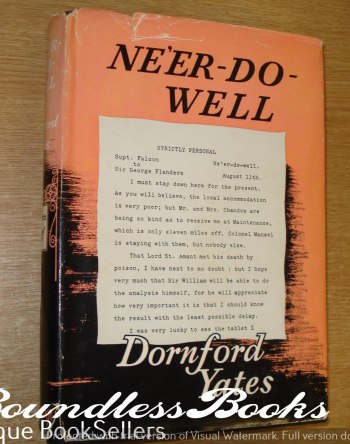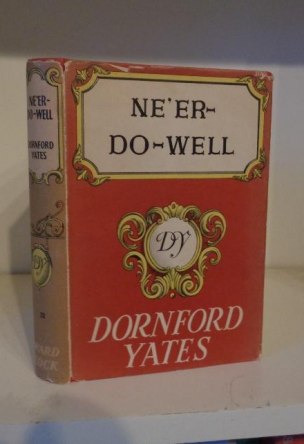Opened:
Updated: 27 Oct 2015




Ne'er-Do-Well by Dornford Yates |
Opened: |
Ne'er-Do-Well (NDW) is a late book in Mercer's writing career. It is an attempt to write straight detective fiction, rather than the light romance of the Berry books and the action/adventure Chandos books. It is narrated by Richard Chandos, and features Jonathan Mansel (now a colonel) as a visitor.
For those not blessed with a copy, I ought to say that NDW was first published in 1954, and was Mercer's last book but two; he died in 1960. I'm afraid it does not show him at the height of his powers. in fact, it's a pretty terrible book, and hard work to read.
To justify my distinctly lukewarm view of NDW, I think I ought to come up with some specific points. And here they are:
1) There is a lot of stuff at the start about the decline of civilisation, levelling-down, and so on, which is Mercer putting across his political and social opinions and lecturing the reader at one remove. For example, Jonah prophesies imminent destruction- presumably by atom-bomb, though that's not spelt out. I don't think this has a place in book designed to entertain and provide a bit of escapism- in the rather sombre climate of 1954 a bit of unalloyed escapism would have been very welcome.
2) Similarily, there is much about the ageing of the characters, which is clearly Mercer expressing himself again- obviously he was feeling his own age. Now, I don't mind characters ageing a bit (cf Peter Wimsey & Harriet) but I don't like it when much-loved characters are aged into decrepitude. It is said that Berry "would never survive a winter in England" which seems to imply he's in a pretty bad way. That grates on me- I strongly feel the Mercer characters should have been immortal in the same way that Bertie Wooster and other long-run characters are. After all, this is light fiction we dealing with here, not actuarial studies.
3) Mercer had a reputation for coming up with picturesque name for people and places, but in NDW this process seems to have gone wholly off the rails.
Firstly I flatly refuse to believe that any English village could ever, under any circumstances, end up with a dismal name like 'Ne'er-Do-Well'. It's a pity it's the title of the book.
Perhaps worst of all, I find it very unsettling that one of the suspects was a thoroughly nasty bit of work called "Berryman". I know that Mercer tended to recycle names - Falcon is both a policeman and (I think) Daphne's ladysmaid in the Berry books. But Berryman? Surely Mercer could have come up with some other name- any other name? Is it some sort of obscure joke or was Mercer in a very literal sense losing the plot?
At the Chandos home there is an alsatian called Oakham. This is horribly close to oakum the preparation of which was a common punishment in prisons. Mercer knew what oakum was as he refers to it in 'The Berry Scene'.
If we keep the 'h', Oakham is the county town of Rutland. In Britain it used to be a well-known brand of tinned ham. And then Oakham crops again as a place, this time.
4) Mercer breaks one of the rules of detective fiction set down by the Detection Club, (Dorothy Sayers et al) when he invents a poison called Mafra, with which the victim is polished off. This is supposed to ensure "A certain painless and swift death: in 30-50 seconds" something which no real poison can do. Cyanide certainly does not work like that except in fiction. Now, there's no reason why Mercer should have felt obliged to follow these rules- I think he used to boast of knowing no other authors, but I'm on Dorothy's side here. (I suppose that makes me a friend of Dorothy?) The use of this imaginary poison is not essential to the plot- the pathologist detects it soon enough- so there seems no reason why a real poison should not have been used. Perhaps an aging Mercer didn't fancy the work involved in researching poisons.
Where does the rather strange name for the poison comes from? There is a Portuguese coastal town called Mafra to the north of Lisbon, and it is probably somewhere that Mercer visited; but this speculation.
5) My House of Stratus reprint edition (2001) has a most off-putting cover in a sort of sludge-colour, showing a chap (incompetently) manacled, and being leered at by a second chap with a slight but definite resemblance to the late Marty Feldman. It seems to have no relation whatever to anything that happens in the book. Not Mercer's fault at all, of course, as it was chosen by Stratus, who published the reprint I have, but it doesn't help. It's the least attractive book cover I've seen in a long time, and I've designed one or two myself.
 |  | Left: Original covers for Ne'er-Do-Well
|
I know it's easy to criticise, and I would hesitate to set any of this down if it wasn't for Mercer banging on so much about his high standards of craftsmanship. Having just published my twenty-fourth book I reckon I have some idea of how it's done. Please feel free to tell me where I get off.
---------------------------------
Having re-read the plagarism note, the only thing that would seem to explain the three points Mercer makes is that someone wrote a book using the characters of Chandos and Falcon, and then passed it off as by "Dornford Yates and Fred Bloggs". (to take a name at random) Presumably Mercer got wind of this before publication and there was some serious legal arm-twisting, without it getting to court. I don't suppose we will find out any more at this stage, which is a great pity. It's hard to think of anything more likely to send Mercer ballistic- I would love to read the correspondence.
On a slight tangent, I note that the copyright is owned by Robin Humphreys and Camilla Kirkpatrick . One wonders if they have a big collection of documents that might see the light one day....
--------------------------------------------------------------------------------
 
|